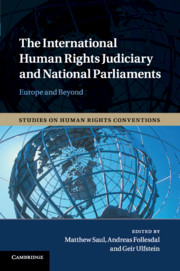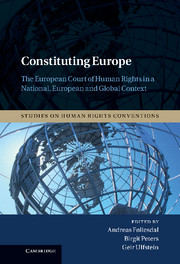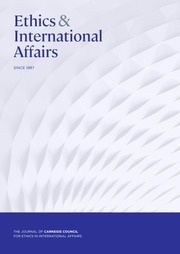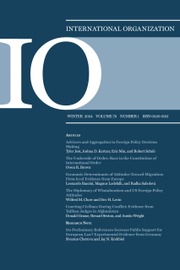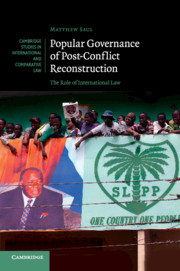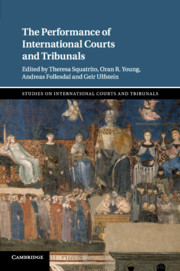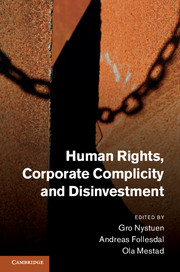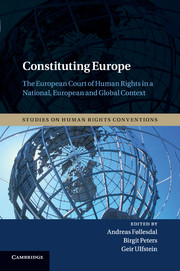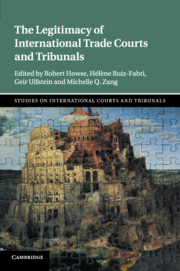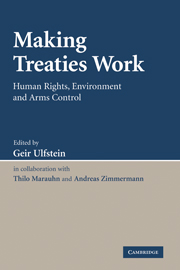The International Human Rights Judiciary and National Parliaments
Europe and Beyond
Part of Studies on Human Rights Conventions
- Editors:
- Matthew Saul, Universitetet i Oslo
- Andreas Follesdal, Universitetet i Oslo
- Geir Ulfstein, Universitetet i Oslo
- Date Published: September 2017
- availability: This ISBN is for an eBook version which is distributed on our behalf by a third party.
- format: Adobe eBook Reader
- isbn: 9781316879948
Find out more about Cambridge eBooks
Adobe eBook Reader
Other available formats:
Hardback, Paperback
Looking for an examination copy?
This title is not currently available for examination. However, if you are interested in the title for your course we can consider offering an examination copy. To register your interest please contact [email protected] providing details of the course you are teaching.
-
The emerging international human rights judiciary (IHRJ) threatens national democratic processes and 'hollows out' the scope of domestic and democratic decision-making, some argue. This new analysis confronts this head on by examining the interplay between national parliaments and the IHRJ, proposing that it advances parliament's efforts. Taking Europe and the European Court of Human Rights as its focus - drawing on theory, doctrine and practice - the authors answer a series of key questions. What role should parliaments play in realising human rights? Which factors influence the effects of the IHRJ on national parliaments' efforts? How can the IHRJ adjust its influence on parliamentary process? And what triggers the backlash against the IHRJ from parliaments and when? Here, the authors lay foundations for better informed scholarship and legal practice in the future, as well as a better understanding of how to improve the effectiveness and validity of the IHRJ.
Read more- Proposes a holistic view of the interplay between the international human rights judiciary and national parliaments, providing new insight into an unexplored yet significant field for scholars of law, political science and philosophy, legal officials and policymakers
- Adds an international judicial dimension to the debate on advancing the human rights role of national parliaments, providing readers with an understanding of how bodies with regional and global focuses relate to an issue that is heavily dependent on national context
- The study benefits from the cross fertilisation of ideas with experts that have backgrounds in law, political science and philosophy, creating material that is accessible and relevant for students and scholars interested in the legitimacy and effectiveness of international human rights adjudication
Customer reviews
Not yet reviewed
Be the first to review
Review was not posted due to profanity
×Product details
- Date Published: September 2017
- format: Adobe eBook Reader
- isbn: 9781316879948
- availability: This ISBN is for an eBook version which is distributed on our behalf by a third party.
Table of Contents
Introduction Matthew Saul, Andreas Follesdal and Geir Ulfstein
Part I. The Human Rights Role of Parliaments:
1. A transnational separation of powers? Geir Ulfstein
2. Effective parliamentary oversight of human rights Kirsten Roberts Lyer and Philippa Webb
3. Citizens' deliberation and human rights Jürg Steiner
Part II. The International Human Rights Judiciary in the Practice of Parliaments:
4. Parliaments as compliance partners in the European convention on human rights system Alice Donald
5. Parliamentary interpretation and application of European human rights law Theresa Squatrito
Part III. National Parliaments in the Practice of the International Human Rights Judiciary:
6. How and when can the international human rights judiciary promote the human rights role of national parliaments? Matthew Saul
7. Obligations to 'secure' the rights of the Convention in an 'effective political democracy': how should parliaments and domestic courts interact? Amrei Müller
8. Shifting emergencies from the political to the legal sphere: placing the United Kingdom's derogations from the ECHR in historical context Colin Murray
9. The role of the European Court of Human Rights in facilitating legislative change in cases of long-term delays in implementation Nino Tsereteli
10. The Inter-American Court of Human Rights and the mobilisation of parliaments Leiv Marsteintredet
Part IV. Managing Relations between Parliaments and the International Human Rights Judiciary:
11. Democratic override (or rejection) and the authority of the Strasbourg court - the UK parliament and prisoner voting Ed Bates
12. Saying 'no' to Strasbourg - when are national parliaments justified in refusing to give effect to judgments of international human rights courts? Colm O'Cinneide
13. Law making by law breaking? A theory of parliamentary civil disobedience against international human rights courts Andreas Follesdal
14. Conclusion: how does, could, and should the international human rights judiciary interact with national parliaments? Matthew Saul.
Sorry, this resource is locked
Please register or sign in to request access. If you are having problems accessing these resources please email [email protected]
Register Sign in» Proceed
You are now leaving the Cambridge University Press website. Your eBook purchase and download will be completed by our partner www.ebooks.com. Please see the permission section of the www.ebooks.com catalogue page for details of the print & copy limits on our eBooks.
Continue ×Are you sure you want to delete your account?
This cannot be undone.
Thank you for your feedback which will help us improve our service.
If you requested a response, we will make sure to get back to you shortly.
×
